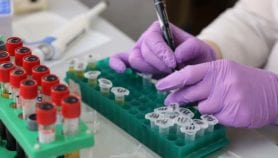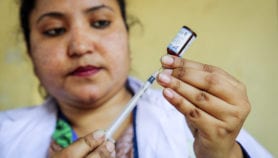By: David Dickson
Send to a friend
The details you provide on this page will not be used to send unsolicited email, and will not be sold to a 3rd party. See privacy policy.
Opposition from the pharmaceutical industry to new rules on access to cheap drugs by developing nations has cast a cloud over political commitments to meeting the needs of the poor.
There was much celebration in November 2001 at the end of a meeting of the World Trade Organisation (WTO) in Doha, Qatar. In response to critics who had argued in Seattle and elsewhere that the provisions of the WTO primarily benefit the rich nations, and in particular the large corporations that operate from these nations, the world's trade ministers proudly presented the so-called Doha Declaration, widely hailed as a genuine effort to shift this balance.
The declaration focused in particular on what is perhaps the most controversial issue surrounding the way international trade rules allegedly discriminate against developing nations. This is the way that international patent agreements help pharmaceutical producers to make significant profits out of the sale of their products in such countries, by being able to restrict generic competition.
Reflecting what become known as 'the spirit of Doha', the declaration contains an explicit promise that the WTO's agreement on Trade Related Aspects of Intellectual Property Rights — the so-called TRIPS agreement — "can and should be interpreted and implemented in a manner supportive of WTO members' rights to protect public health and, in particular, to promote access to medicines for all".
Just over a year later, the heady promise of Doha lies on the verge of collapse. A fortnight ago, negotiators failed to meet a deadline set at Doha to find a resolution to a widely-recognised weakness in the text of the TRIPS agreement "by the end of 2002". This is the fact that, although the agreement currently permits the compulsory licensing of patents where such a move is considered necessary to protect public health, this measure can only be used by countries with the capacity to produce the drugs they need.
Importing generic drugs
TRIPS provides no special concessions for those countries that have little or no capacity for pharmaceutical production, and therefore need to import most of their drugs from abroad. This omission means, for example, that many of the African countries most in need of inexpensive medicines are unable at present to legally import cheap generic copies from countries such as India and Brazil, including cut-rate anti-retroviral drugs that have been so effective in limiting the spread of HIV/AIDS and in extending the lives of those already infected.
Doha established a process to try to remedy this situation through the TRIPS Council. It failed when the United States refused to endorse a draft proposal on the issue that had been drawn up by the chair of the council, Eduardo Pérez Motta of Mexico. The proposal attempted to establish a compromise between those developing countries and their supporters who were seeking to obtain the maximum-possible freedom for such countries to buy and produce drugs, and pharmaceutical companies who argued that granting such wide-ranging freedoms would undermine the whole international system of patent protection.
The compromise proposal sought to find an acceptable formula for doing this, for example, by placing limitations on the number of diseases that could be dealt with in this way, and on the types of products that would be covered (at Japan's insistence, for example, the compulsory licensing measures would not be applicable to vaccines). There would also be strict rules defining which countries were eligible to apply such measures. Even these proposals, however, were insufficient to win the support of the pharmaceutical lobby, and the negotiators went home empty-handed.
Industry opposition
The failure of the negotiations was not a total surprise. There had long been signals that the pharmaceutical industry did not universally share "the spirit of Doha", and would fight hard for tight restrictions on the interpretation of the declaration agreed there. And this is exactly what has happened. Indeed, even the suggested compromise was perceived as too accommodating of the industry's concerns by many groups — such as Oxfam and Médecins sans Frontières — who urged that it should be rejected by the developing world as insufficient to meet their needs.
Nevertheless the rejection of the terms by the pharmaceutical industry has sent a deep chill through the whole development debate. To his credit, US trade negotiator, Robert Zoellick, appears to have been aware of the damage that the industry's response is likely to inflict on his broader efforts to bring developing countries into the global market economy. Even his words of caution, however, have failed to win over industrial lobbyists not only from the United States but other countries with powerful pharmaceutical lobbies, such as Switzerland and Japan.
These groups are keen, for example, to limit the opportunity for compulsory licensing on patents to specific infectious diseases, rather than allowing a broad exemption that would not discriminate between a treatment for HIV/AIDS and one for cancer. They also want to limit eligibility to countries with no manufacturing capability, omitting those — such as South Africa, Kenya, Ghana, Nigeria, Zimbabwe and Uganda — that have some ability to produce their own drugs, but far from enough to meet the wide range of massive health needs that they face.
Time for a last push
Various diplomatic formulae are available to meet the challenge of designing an international intellectual property regime that protects the interests of the pharmaceutical industry in its major markets while releasing developing countries from some of the obligations imposed by TRIPS. The European Parliament, for example, has proposed a wording in the spirit of the Doha Declaration that would allow manufacturing "if the medicinal product is intended for export to a third country that has issued a compulsory licence for that product". Other opportunities exist for ensuring that the international patent regime is moulded more sensitively to meet the needs of developing nations, as described in the recent report of the UK's Commission on Intellectual Property Rights (link to Patents 'could hinder poverty reduction', 12 September 2002).
Nor is the window of opportunity closed. Even if the TRIPS Council has failed to meet the deadline set by negotiators in Doha, a general sense of political urgency on the issue remains. Supachai Pantichpakdi, director general of the WTO, has urged the Council to restart its deliberations, and to try to reach agreement by the first meeting of the General Council of the WTO, which takes place on 10 February.
Hopefully a pause for reflection over the Christmas period will have given governments time to reflect on the political cost of failure in these negotiations. Such a failure would send out a powerful signal about their apparent unwillingness to translate words into deeds when it comes to helping the developing world. And the much-praised "spirit of Doha" will have been buried unceremoniously. The poor deserve better.
© SciDev.Net 2003













